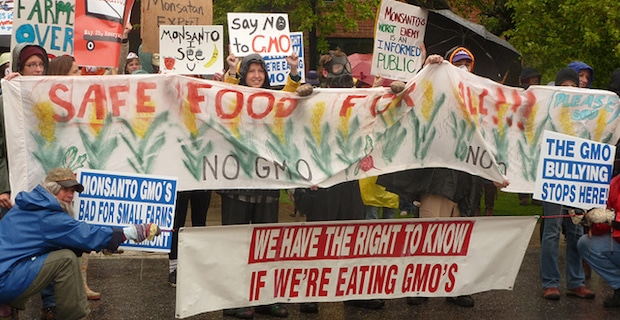
Four organizations filed a lawsuit against Vermont’s recently passed law (Act 120) that requires all food containing genetically modified organisms (GMO) to be labeled. The bill was signed into law on May 8 by governor Peter Shumlin, and will go into effect on July 1, 2016. The organizations in the lawsuit include Grocery Manufacturers Association, Snack Food Association, International Dairy Foods Association and National Association of Manufacturers. Members of Grocery Manufacturers Association include Monsanto.
The complaint filed by the four organizations contends that Vermont’s GMO labeling law “violates the United States Constitution.” The complaint specifically takes issue with the deadline for companies to comply with the law, contending that is is a “difficult, if not impossible, deadline for Plaintiffs' members to meet.” The companies, according to the complaint, must “must revise hundreds of thousands of product packages, from the small to the super-sized,” in order to meet the deadline, and “establish Vermont-only distribution channels to ensure that the speech Vermont is forcing them to say, or not say, is conveyed in that State.” Some companies will end up revising labels for all products, “no matter where they might be sold in the United States.” Read more about Vermont's GMO Labeling Law
The state of Vermont is committed to the bill and fighting the lawsuit. Attorney General William Sorrell told the Burlington Free Press that he had anticipated a potential lawsuit and “it would be a heck of a fight, but we would zealously defend the law.” Sorell added, “We have been gearing up.”
Food advocacy groups are also committed to fighting the lawsuit. Organic Consumers Association (OCA), through its lobby, the Organic Consumers Fund, committed to contributing to defend Vermont’s labeling law. The OCA even calls on consumers to boycott the products sold by member companies of the Grocery Manufacturers Association. The Vermont Right to Know Coalition has vowed to fight the lawsuit. The group stated on its website that “the State and members of the Vermont Right to Know GMOs coalition are working to mount a strong defense of the law.”
The Vermont Public Interest Research Group is yet another organization that supports Vermont’s GMO labeling law. The organization committed to “work closely with attorneys at the Vermont Law School’s Environmental and Natural Resources Law Clinic, and the state to stand up and defend this important consumer protection law in court,” according to a statement.
The GMO labeling bill itself anticipates challenges. The bill states that if “any provision of this chapter or its application to any person or circumstance is held invalid or in violation of the Constitution or laws of the United States or in violation of the Constitution or laws of Vermont, the invalidity or the violation shall not affect other provisions of this section which can be given effect without the invalid provision or application, and to this end, the provisions of this chapter are severable.”
Read more about the 8 most common GMO foods
Maine and Connecticut also passed GMO labeling laws within the past year. The results of the Vermont lawsuit could affect their laws and send a warning to other states not to pass labeling laws.
Photo: Cedar Circle Farm & Education Center




